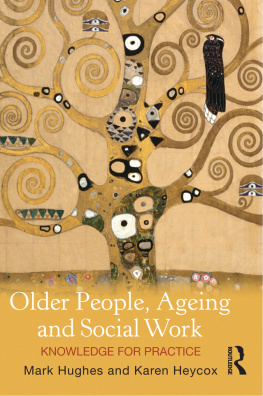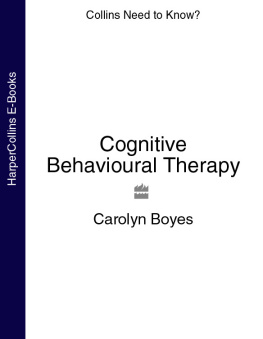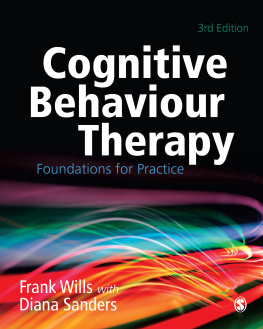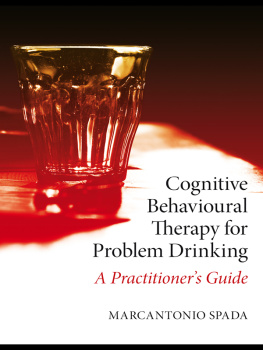COGNITIVE-BEHAVIOURAL SOCIAL WORK IN
PRACTICE
To the memory of Albert Kushlick, MD FRCP
Died on 25 August 1997
and
To Mark, Alice and Joe
First published 1998 by Ashgate Publishing
Published 2017 by Routledge
2 Park Square, Milton Park, Abingdon, Oxon, 0X14 4RN
711 Third Avenue, New York, NY 10017, USA
Routledge is an imprint of the Taylor & Francis Group, an informa business
All rights reserved. No part of this book may be reprinted or reproduced or utilised in any form or by any electronic, mechanical, or other means, now known or hereafter invented, including photocopying and recording, or in any information storage or retrieval system, without permission in writing from the publishers.
Notice:
Product or corporate names may be trademarks or registered trademarks, and are used only for identification and explanation without intent to infringe.
British Library Cataloguing in Publication Data
Cognitive-behavioural social work in practice
1.Social service 2.Cognitive psychology 3.Behaviour therapy
I.Cigno, Katy II.Bourn, Diana
361.3'019
Library of Congress Catalog Card Number: 98-70985
ISBN 13: 978-1-85742-373-0 (hbk)
ISBN 13: 978-1-85742-374-7 (pbk)
Typeset by Manton Typesetters, 5-7 Eastfield Road, Louth, Lincolnshire,
CONTENTS
Carole Sutton
Katy Cigno and Diana Bourn
Brian Sheldon
Tammie Ronen
Diana Bourn
Dorota Iwaniec
Peter Burke
Mansoor A.F. Kazi and Safina Mir
Clive R. Hollin
Peter Raynor and Maurice Vanstone
Albert Kushlick, Dave Dagnan and Peter Trozver
Gillian Tober
J.P.J. Oliver and Barbara L. Hudson
Katy Cigno
Jonathan Parker
Katy Cigno
Diana Bourn is Lecturer in the Child Protection Studies Centre, School of Social Work, University of Leicester and a Social Worker in a Social Services Children and Families Team.
Peter Burke is Senior Lecturer, School of Community and Health Studies, University of Hull.
Katy Cigno is Senior Lecturer in the Department of Social Work, University of Hull and a Practice Teacher with Wakefield Community and Social Services Department.
Dave Dagnan is Consultant Clinical Psychologist, West Cumbria Healthcare NHS Trust.
Clive Hollin is Professor of Criminological Psychology in the Centre for Applied Psychology at the University of Leicester and a Fellow of the British Psychological Society.
Barbara L. Hudson is Lecturer in Applied Social Studies and Fellow of Green College, University of Oxford.
Dorota Iwaniec is Professor and Head of Department of Social Work and Director of the Centre for Child Care Research, The Queen's University of Belfast.
Mansoor A.F. Kazi is Senior Lecturer in Social Work and Applied Social Studies, University of Huddersfield, and Director of the Centre for Evaluation Studies at the same university.
Albert Kushlick was, until his recent and untimely death, Consultant Psychiatrist in Learning Disability, North Downs Community Health Trust and a freelance behavioural consultant.
Safina Mir is a Community Care Social Worker, Bradford Social Services Department.
J.P.J. Oliver is Senior Lecturer, School of Psychiatry and Behavioural Science, University of Manchester, and Regional Coordinator for Mental Health Development, NHSE (North West).
Jonathan Parker is Lecturer in Clinical Social Work, School of Community and Health Studies, University of Hull, and an accredited behavioural and cognitive psychotherapist.
Peter Raynor is Professor of Applied Social Studies, Department of Social Policy and Applied Social Studies, University of Wales, Swansea.
Tammie Ronen is Senior Lecturer, The Bob Shapell School of Social Work, Tel-Aviv University, and President of the Israeli Association of Behaviour Therapy.
Brian Sheldon is Professor of Applied Social Research and Director of the Centre for Evidence-Based Practice, University of Exeter.
Carole Sutton is Principal Lecturer in Psychology, School of Health and Community Studies and Director of the Centre for Parent Education and Training, De Montfort University.
Gillian Tober is Head of Training, Leeds Addiction Unit, Team Leader, Leeds North Community Addictions Team, Honorary Lecturer, University of Leeds, and a member of the Executive Committee for the Study of Addiction.
Peter Trower is Senior Lecturer in Clinical Psychology, University of Birmingham.
Maurice Vanstone is Lecturer in Applied Social Studies, University of Wales, Swansea, and until recently held a joint appointment as Senior Probation Officer in the Mid Glamorgan Probation Service and Lecturer at Swansea.
Carole Sutton
A useful image which I use when trying to help students understand how concepts like policy, research and practice can be made sense of and integrated is that of a triangle: the bottom of the triangle is policy, associated with values; the two other sides are research, associated with theory, and practice. These concepts are fundamental to social work, and the image, I find, helps students grasp the interplay between them.

Social work has for decades been influenced by ideologies of human behaviour which do not hold up under the challenges of reality. It has only occasionally been influenced by theoretical ideas which are well grounded in rigorous research, and when it has taken such research on board, this has served it well. For example, the time-linked 'task-centred' approach, identified in a well-designed research project by Reid and Epstein in 1972 as more helpful to clients than an open-ended, unstructured approach, is still a reliable tool in most social workers' repertoire. It has clear links to learning theory and cognitive-behavioural practice, and is likely to continue to serve clients and social workers well in the future. We should continue to base our work upon such well-grounded approaches.
It is already becoming apparent that the new Labour government is likely to be just as committed to investigating 'What works' as was its predecessor; social work is being placed under very close scrutiny indeed in respect of its funding and administration. As we hear from the media day by day, policy and practice in the fields of health, education, business and leisure are all being influenced by research reports: reports about diet, health, education, the air we breathe, and the value of animal companions to human well-being. In these circumstances, it behoves us all to look closely at the research underpinnings of social work so that we can demonstrate both accountability and cost-effectiveness.








